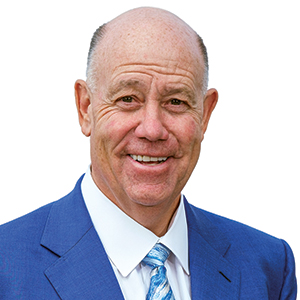There’s a correlation between many life lessons and investment lessons. Whether in life, business or investing, when we do what we are passionate about and are good at it, we can be exponentially more successful.
Ted Williams was one of the greatest hitters in baseball history with a batting average of over .400. Warren Buffett has shared that his high average was because he’d only swing when there was a “fat pitch.” During Williams’ career, he outlined there are approximately 77 strike zones and figured out which pitches he was the best at hitting. Buffett does the same with investing.
Through decades of investing, I have tried several strategies and have reflected on my successes and mistakes to uncover my strengths, what I enjoy, what I understand and where I have done well. I am committed to lifelong learning — whether that is educating myself on other companies or investors, or learning from my mistakes. I uncovered that I have had greater success when picking proven businesses with outstanding returns. These are typically exceptional wide-moat companies with competitive, durable, sustainable advantages when they were either out of favor because of market conditions or were dealing with short-term problems. I call these forever quality value growth compounders.
On the other hand, I have tried numerous strategies with which I wasn’t successful. I spent an enormous amount of time reviewing over 750 of my public equity picks of over a decade. Over 90 percent of my mistakes were in value traps and growth traps. Many great investors have found that you should make fewer mistakes because your winners will take care of themselves. Understanding this now, I can make wiser decisions that will help me overall. I try to stay disciplined while working on setting parameters to best manage risk.
Peter Drucker, a renowned management consultant, said, “Most people see what they want to see, not what they are.” It’s not only about doing smart things; it’s about trying to avoid doing foolish things by being intellectually honest.
I am most confident with wide-moat public stocks. When investing in private equities or real estate, I rely on managers that possess high integrity and the three P’s: People, Process and Performance.
Investing is part business and part human nature — part science and part art. It’s needing to be the hunter in the woods; prepared to shoot versus chase (stretching). Having a watch list and a process to duplicate is important. Charlie Munger encouraged inversion thinking, looking at each situation by turning it upside down to uncover the reasons you should not make an investment. Investors improve their performance not through what they buy, but through what they exclude — by avoiding losers.
The ability to forecast short-term cycles is ridiculously hard and circumstances can change. It’s about finding high-quality businesses and buying at attractive valuations that could grow and prosper long-term. Let the magic of compounding work.
It’s much safer to buy proven companies with strong, consistent and predictable results. The S&P 500 and Dow Jones prove that buying the best businesses in America produces attractive investment returns over extended periods of time.
Aiming to get rich fast or competing in areas where we have a disadvantage is a way to get beat badly. When trying to hit home runs, it’s imperative to learn what we’re good at, where we have had proven success and what we enjoy. If we improve the process, we can increase the odds of having better results or outcomes. Be patient and have a long-term perspective. And like Ted Williams, swing when in your sweet spot.
Umberto P. Fedeli is CEO of The Fedeli Group.

